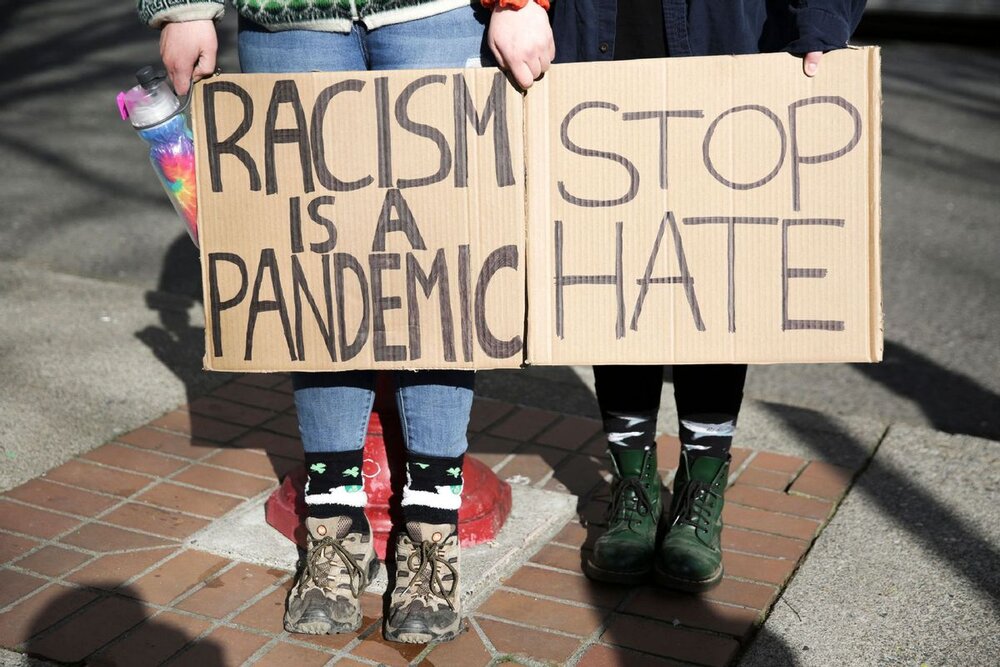U.S. hate crime hits 12-year high

The U.S. Federal Bureau of Investigation (FBI) has reported the number of hate crimes in America rose last year to the highest level in more than a decade.
According to the FBI, the incidents had been driven by a rise in assaults targeting Black victims as well as victims of Asian descent.
The 2020 data, had been submitted to the FBI by more than 15,000 law enforcement agencies across the nation.
It identified 7,759 hate crimes in 2020, that is a 6% increase from 2019 and the highest tally since 2008.
However, experts widely acknowledge that this number is much lower than the actual figure for multiple reasons.
The FBI data itself shows the number of offenses targeting Black Americans rose to 2,755 from 1,930. This is while incidents against Asian Americans jumped to 274 from 158.
7,426 hate crime offenses have been classified as crimes against people, as opposed to crimes against property, 53.4% have been classified for intimidation, 27.6% have been documented for assault and 18.1% have been logged as aggravated assault.
The figures also include twenty-two race-related murders and 19 rapes were reported as hate crimes.
The U.S. Justice Department has warned that white supremacist groups represent a rising security threat after the deadly January 6 insurrection on the U.S. Capitol.
In May, the Anti-Defamation League's Center on Extremism, which has tackled racist propaganda for decades, said Incidents of white supremacist propaganda hit an all-time high in 2020,
The Center on Extremism said the increased propaganda is another indication of how divided America has become.
"As if a pandemic, social justice protests, and a polarizing election were not enough, one of the other things we've been dealing with is a significant increase in efforts by white supremacists to spread their messages around the country,"
The U.S. attorney general, Merrick Garland, says “preventing and responding to hate crimes and hate incidents is one of the justice department’s highest priorities”
“The FBI Hate Crime Statistics for 2020 demonstrates the urgent need for a comprehensive response.”
Garland says most hate crimes were motivated by race, ethnicity, and ancestry.
In May, Garland outlined new steps to help state and local police track and investigate hate crimes.
But historically hate crimes have been under-reported to the FBI by local law enforcement, which is why Garland has called for the department to speed up the review of possible hate crimes and the way they are recorded.
He added that “these numbers confirm what we have already seen and heard from communities, advocates, and law enforcement agencies around the country, and these numbers do not account for the many hate crimes that go unreported.”
One of the problems is that law enforcement agencies are not legally required to submit their data to the FBI for its annual crime report.
There are more than 18,000 agencies in the United States and more than 3,000 did not submit their crime statistics in 2020.
The FBI's data may also be incomplete because among some jurisdictions, it is the local prosecutors, not the police, who decide what is classified as a hate crime.
This is while the federal government does not collect hate crime statistics from local prosecutors or courts.
Many activists and lawmakers maintain that the actual number of hate crimes is larger than those reported, arguing that local police are poorly trained in identifying and classifying such crimes and lack the required resources or even the interest.
At the same time, reports of hate-inspired attacks on Asian Americans and Pacific Islanders have also been on the rise, spurred by what many say were former President Donald Trump's inflammatory remarks blaming the COVID-19 pandemic on China.
Trump widely used the term to deflect attention from his administration’s devastating mishandling of the pandemic that has led the U.S. to log the most fatalities in the world.
Stop AAPI Hate, a national coalition that tracks racially motivated self-reported hate crimes against Asian Americans and Pacific Islanders, recently said there had been more than 9,000 anti-Asian hate crimes since the coronavirus pandemic began.
Speaking to the Washington Post, Judy Chu, the chair of the Congressional Asian Pacific American Caucus says “while the numbers in this report are shocking, we know that they are not even close to the complete picture”
In April, a hate crimes bill to combat violence against Asian Americans passed the U.S. Senate with overwhelming bipartisan support.
The measure, authored by Democratic Senator Mazie Hirono and Representative Grace Meng, designated a Justice Department employee to expedite a review of hate crimes reported to police during the COVID-19 pandemic.
How effective the measure will be in reporting the actual hate crime figures will have to be analyzed in next year’s FBI report.
Leave a Comment